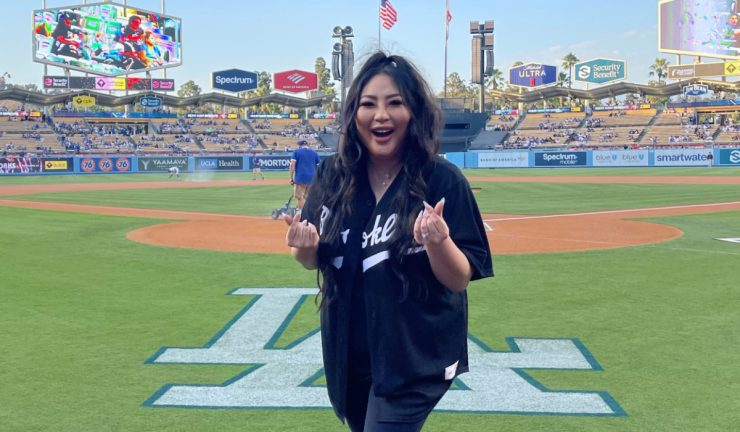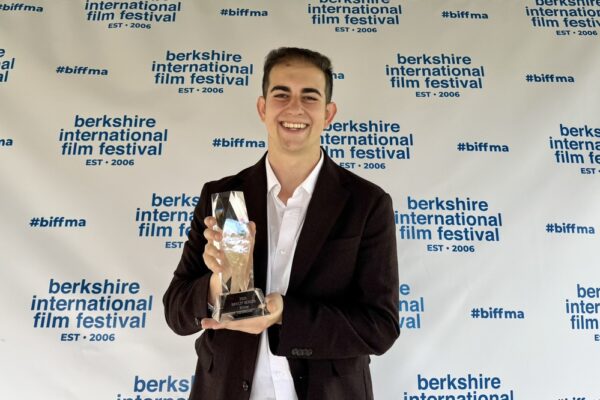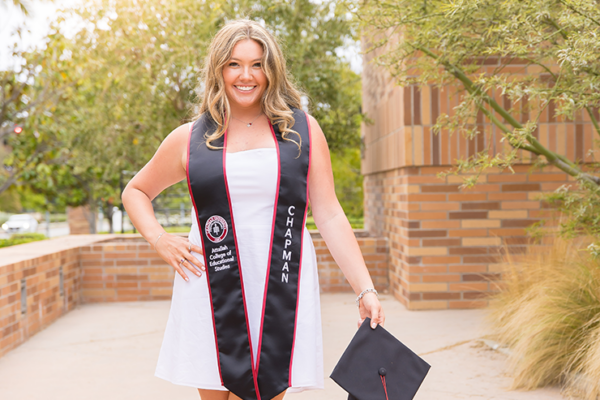Since the age of five, Elaine (Cha) Yu ’13 always thought she was going to be a performer. Now, her digital agency Beverly Hills Society is a “safe haven” for diverse performers and creators in the content creation industry.
From the Physical to the Digital Stage
Yu transferred to Chapman as a senior and studied vocal performance, juggling a rigorous music program, four jobs, sorority rushing and more. After graduation, she found herself working in logistics for her father’s import-export business and later started her own event planning company that operated for ten years.
Then, at the peak of the pandemic, she received an opportunity out of the blue to be head of brand partnerships at a content house. Self-taught in two weeks, she brought in sole revenue and worked with influencers and creators with millions of followers. “How did this happen? This happens in movies. This doesn’t happen [to anyone],” recalls Yu.
She attributes her quick acclimation and success to her background as a performer needing “to have a really good grasp on your audience […] not just one person but twenty, hundreds, thousands of people. You start growing your intuition.”
Over time, Yu wanted to take a step back from the challenges and superficiality she had experienced but creators were still knocking on her door for help. Yu responded by launching her own digital agency, Beverly Hills Society. “I can’t just sit back and watch. If I’m passionate about something, I will say something […] if I can be that one person or the one agency that can be like a safe haven [I want to do that].” From facilitating brand deals and partnerships to events and management, Yu helps her creators “be on a good path and be protected.”
Amplifying Diverse Voices, Inspired by Chapman
Yu aims to work with creators she can believe in and genuinely support. And while her agency is open for all types of creators and not necessarily specific to Asian creators, she does have a vision of supporting the APIDA community.
She recalls not seeing “a lot of creators or influencers that are Asian and dominating mainstream.” Thinking ahead as a Korean woman married to a Chinese man, she would ask herself, “What about when my kids are on social media [and who will they see?] I need to do something more meaningful […] it’s just not enough.”
While she had never scouted talent before, there were two Asian creators she intentionally sought out who were passionate about bridging the community with her. “The girls are very passionate about — and very proud — to be Asian and some of them are Asian American. We are just out here trying to be like ‘Hey, if we can do it, you can do it.’ Something for other little Asian girls who are going to be like, ‘Hey, she kind of looks like me’,” says Yu.
“The power of believing in someone — I’ve seen it, I’ve felt it. If I can offer that, why not?” Yu passionately shares about her Chapman professors who had that same belief in her as a student. Noting Patty Gee, Dr. Cheryl Fielding, and Dr. Stephen Coker — all faculty in the vocal performance program in the College of Performing Arts — Yu says, “they really made such a difference in my life […] They just made me feel like ‘You’re more than enough. We see something great for you — whether it’s music, whether it’s not. You’re going to be fine’ […] And that was something I needed.”
With a similar spirit, her “plan is to walk hand-in-hand with [her] creators. Some of them want to perform, be actresses or model.” Yu wants to “be part of the progress and take them out towards their goal — together.”
What the Future Holds, and a Charge to the Community
Yu’s not looking to miss out on opportunities that come her way. She says, “the biggest thing is preparing,” giving examples of having creators learn different languages to open international opportunities or singing training if they want to become a performer.
She also acknowledges the phenomenon of APIDA culture growing worldwide, notably the rise of K-Pop. In her industry, she sees how it “kind of acts like leverage” where it’s making a big difference for APIDA creators, “but I want us to have opportunities outside May [being APIDA Heritage Month],” says Yu. She shares how she’s not afraid to speak up for her creators, firmly believing that companies who listen are the ones she wants to work with.
“Advocate for yourself and for each other, or no one else will. […] if you see something, say something,” says Yu when asked about how others can advocate for diverse voices and the APIDA community. “You make that space for yourself.”
Surrounding herself with a diverse community of human beings is another way that Yu grows. “You have to advocate for yourself but [also] for each other [and] continue to educate [one another] because without that, we are just going to stay exactly where we are, and that’s not what we want.”
Watch the full interview to learn more about Yu and her Chapman experience.



